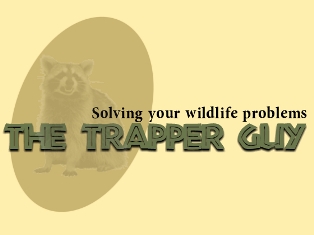|

727-710-0373
Serving
the entire Tampa Bay area 24/7
Click
here for a free estimate Rattlesnakes
There are two types
of rattlesnakes in the Tampa Bay
area to be concerned with.
The first is a Pygmy
rattlesnake. It is a small rattler
and although poisonous it is not
fatal except for maybe small pets.
The second type
is the Eastern Diamondback rattlesnake.
This rattler is the most dangerous
snake in North America. It recquires
immediate medical attention and
can be fatal.
Never try to identify
these snakes on your own. Stay
clear of them and call The Trapper
Guy. We specialize in Tampa rattlesnake removal.
Please don't kill
snakes! Even the poisonous ones
are beneficial in that they keep
down the rodent populations.
Call
today!
727-710-0373
Excerpt from great
article:
Recognizing
Florida's Venomous Snakes
Steve A. Johnson and Martin B.
Main
Florida is home to 45 species
of native snakes, six of which
are venomous (poisonous). The
venomous species include five
pit vipers (Eastern Diamond-backed
Rattlesnake, Timber Rattlesnake,
Pygmy Rattlesnake, Copperhead,
and Cottonmouth) and the Coral
Snake. Copperheads and Timber
Rattlesnakes have a limited range
in Florida. Copperheads only occur
in a small area of Florida's Panhandle
just west of Tallahassee, and
Timber Rattlesnakes are only found
in northern Florida as far south
as Gainesville and in limited
portions of the Panhandle. The
other four venomous species are
found throughout the state. Florida's
venomous snakes occur in a variety
of natural habitats, ranging from
swamps to dry woods.The five species
of pit vipers all share several
characteristics. The pupils of
their eyes are vertical (cat-like)
and they have a deep facial pit
between each eye and nostril.
These characteristics can be difficult
to see unless a snake is examined
closely, so do not rely on them
to differentiate venomous from
non-venomous species. Florida's
pit vipers have blocky, triangular-shaped
heads that are distinctly broader
than their necks. Relative to
their length, these species are
heavy-bodied snakes.Although each
of the six venomous species in
Florida have unique characteristics
that allow them to be readily
identified by experts, there are
many non-venomous species with
which the venomous species may
be confused. Therefore it is best
not to attempt to capture, harass,
or harm any snake. To do so may
put you at risk of being bitten
by a venomous species.Eastern
Diamond-backed RattlesnakeThis
is a very dangerous snake and
should not be approached. The
Eastern Diamond-backed Rattlesnake
is Florida's largest venomous
snake and may exceed six feet
in length. It occurs throughout
Florida in a variety of dry habitats,
such as pinelands, scrub, and
golf courses .Eastern Diamond-backed
Rattlesnakes have bold markings
down their backs that include
a row of large, dark diamonds
with brown centers and cream-colored
borders . The tail ends in a rattle
that is used to make a loud buzzing
sound when the snake feels threatened.
Some individuals may not rattle,
even when they are poised to strike.
The large, thick head has a light-bordered,
dark stripe running diagonally
through the eye to the rear of
the jaw. The scales of this species
are strongly keeled (i.e., there
is a ridge along the center of
each scale), giving these snakes
a rough appearance. The young
are similar to adults in color
pattern.Pygmy RattlesnakePygmy
Rattlesnakes are the smallest
of Florida's venomous snake species.
Adults rarely exceed 20 inches
in length. Pygmy Rattlesnakes
range throughout the state and
occur in many different habitats
that include pine flatwoods, oak
scrub, open pinelands, and palm
hammocks.This is one of the most
commonly encountered venomous
snakes that occasionally is found
in residential neighborhoods.
Pygmy Rattlesnakes have a dark
band that runs from each eye to
the rear of the jaw ( Figure 11
). Their bodies are covered with
numerous dark blotches with a
row of darker blotches running
down the middle of the snake's
back. Usually a series of reddish-brown
marks can be seen between the
blotches on the back. The rattle
on the tip of the tail of this
species is so small that it cannot
be heard even when shaken vigorously
by the snake. Pygmy Rattlesnakes
are bold and will often hold their
ground if approached. They will
bob their head and strike into
the air if they feel threatened.
Footnotes
1. This document is WEC 202, one
portion of a 4-part package of
the Department of Wildlife Ecology
and Conservation entitled "Dealing
with Venomous Snakes in Florida
School Yards." Institute
of Food and Agricultural Sciences
(IFAS), University of Florida.
First published: September 2005.
Please visit the EDIS Web site
at http://edis.ifas.ufl.edu. Accompanying
documents are available by contacting
Steve A. Johnson (johnsons@wec.ufl.edu)
or Martin B. Main (mbma@mail.ifas.ufl.edu).
A free PowerPoint presentation
(with speaking notes) about venomous
snakes in Florida is available
upon request from Steve A. Johnson.
2. Steve A. Johnson, Assistant
Professor and Extension Specialist,
Department of Wildlife Ecology
and Conservation, Mid-Florida
Research and Education Center,
University of Florida's Plant
City Campus, 33563; Martin B.
Main, Associate Professor and
Extension Wildlife Specialist,
Department of Wildlife Ecology
and Conservation, Southwest Florida
Research and Education Center,
Institute of Food and Agricultural
Sciences, University of Florida,
Immokalee, FL 34142.
--------------------------------------------------------------------------------
Copyright
Information
This document is copyrighted by
the University of Florida, Institute
of Food and Agricultural Sciences
(UF/IFAS) for the people of the
State of Florida. UF/IFAS retains
all rights under all conventions,
but permits free reproduction
by all agents and offices of the
Cooperative Extension Service
and the people of the State of
Florida. Permission is granted
to others to use these materials
in part or in full for educational
purposes, provided that full credit
is given to the UF/IFAS, citing
the publication, its source, and
date of publication.
|